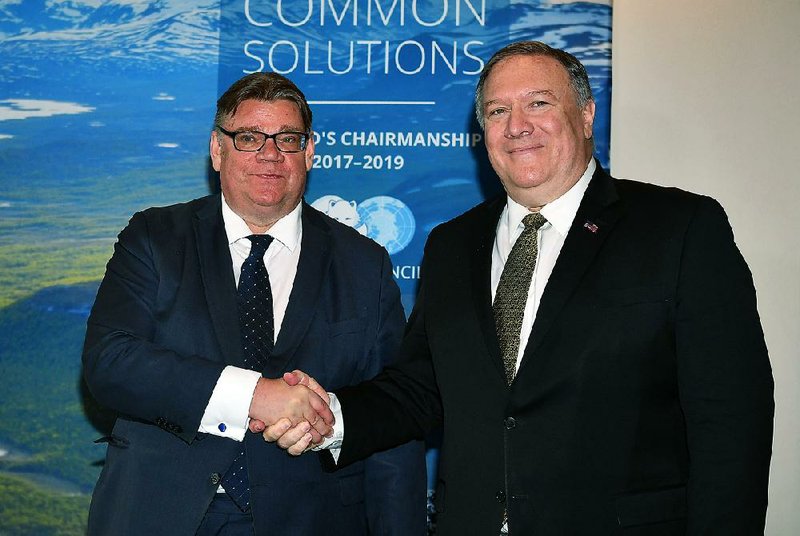Secretary of State Mike Pompeo warned of the dangers of Russian militarization and Chinese investment in the Arctic, a region he described as "an arena of global power and competition."
Speaking in Finland on Monday at the opening session of the Arctic Council, a body of eight nations with territory in the region, Pompeo said the members should no longer limit their focus to scientific collaboration, cultural matters and "environmental research into events that may or may not occur in 100 years," an oblique reference to climate change.
"We're entering a new age of strategic engagement in the Arctic, complete with new threats to the Arctic and its real estate, and to all of our interests in the region," he said.
The Pentagon has been expressing concern about Russia and China expanding their activities in the Arctic as polar ice diminishes and opens new channels to explore natural resources and add shipping lanes. The region is believed to hold 13 percent of the world's undiscovered oil and 30 percent of the undiscovered gas, plus uranium, rare earth minerals, gold and diamonds. Pompeo said the new Arctic sea lanes could become the 21st-century version of the Suez and Panama canals.
Russia has built three new military bases in the Arctic, restored Soviet-era bases and proposed teaming up with China to build a new sea route for cargo shipments between Asia and Europe. Pompeo said that, even in international waters in the Arctic, Russia already demands that other nations get its permission to use an existing route.
"These provocative actions are part of a pattern of aggressive Russian behavior here in the Arctic," Pompeo said. "Russia is already leaving snow prints in the form of army boots."
Pompeo acknowledged that Russia, with its huge expanse in the Arctic, has legitimate interests in the region. But he warned that the nation's territorial ambitions could turn the Arctic into another Ukraine, a former Soviet state where a civil war is raging as a result of Russia-backed separatists.
"Just because the Arctic is a place of wilderness does not mean it should become a place of lawlessness," Pompeo said. "It need not be the case. And we stand ready to be sure it does not become so."
Pompeo met briefly with Russian Foreign Minister Sergey Lavrov on the sidelines of the gathering.
In remarks to reporters afterward, Pompeo said his conversation with Lavrov was "factual."
"I was just laying down the data set and also urging all those nations that truly want free and open navigation, who want market systems to work, who want the private sector to dominate, create success and wealth and security and free passage in the Arctic, all those nations who are prepared to come together and work on that, we welcome," he said.
Lavrov told reporters that the conversation with Pompeo was "constructive."
"I am of the view that we have made quite a good step forward to follow up on the discussions that President Vladimir Putin and President Donald Trump had on the phone a couple of days ago," he said.
Pompeo was dismissive toward China, which has invested about $90 billion in the Arctic since 2012. Beijing built a polar research institute in 2009 and has financed several scientific expeditions to the Arctic. Although China claims to be a "near-Arctic state" and has observer status in the Arctic Council, Pompeo said that entitles the country to "exactly nothing."
Last week, the Pentagon said China's growing involvement in the Arctic could lead to a military presence, including the potential deployment of submarines to deter against a nuclear attack.
Pompeo said the pattern of Chinese investment in other parts of the world suggests that indigenous communities in the Arctic could become ensnared by debt and corruption, shoddy infrastructure, militarization and economic destruction.
A Section on 05/07/2019
